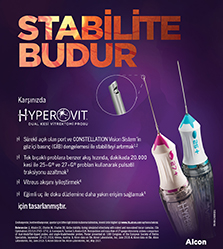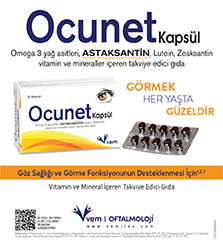2S.B. Ankara Ulucanlar Göz Eğitim Hastanesi, 2. Göz Klinik Şefi, Ankara Purpose: This study aims to observe the efficacy of heavy silicone oil in decreasing the rate of proliferative vitreoretinopathy (PVR) development, by means of tamponating the inferior retina due to its high gravity.
Materials and Methods: This study involved 21 eyes of 21 patients with complicated retinal detachment and PVR, who underwent vitreoretinal surgery with heavy silicone oil (Oxane HD) tamponade. The patients were followed for a mean period of 5,02 months, and observations were done regarding the effectiveness, complications, success and failure rates of heavy silicone oil.
Results: All eyes had retinal detachment and PVR grade C3 or more. The etiologies of retinal detachments included rhegmatogen retinal detachment (6 eyes), redetachment (11 eyes), tractional retinal detachment secondary to proliferative diabetic retinopathy (3 eyes), and traumatic retinal detachment secondary to ocular perforation (1 eye). The overall anatomical success rate was 85.7%, and visual improvement was achieved in 71.4% of the eyes at the end of the follow-up period. Redetachment and PVR development occured in 14.2% of the eyes. The other postoperative complications included temporary increase in ocular pressure (2 eyes), silicone oil in anterior chamber (2 eyes) and cataract formation (4 eyes).
Conclusion: The results of this prospective study demonstrates that, heavy silicone oil improves both early and late postoperative success rates in vitreoretinal surgery.
Keywords : Retinal detachment, proliferative vitreoretinopathy, intraocular tamponades, heavy silicone oil, Oxane HD



